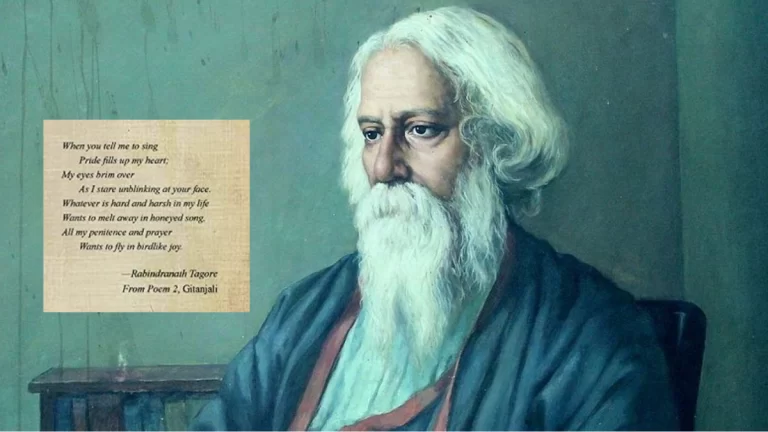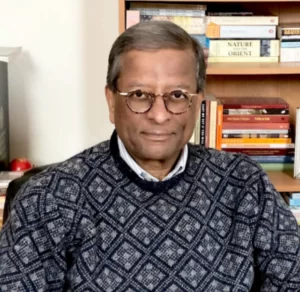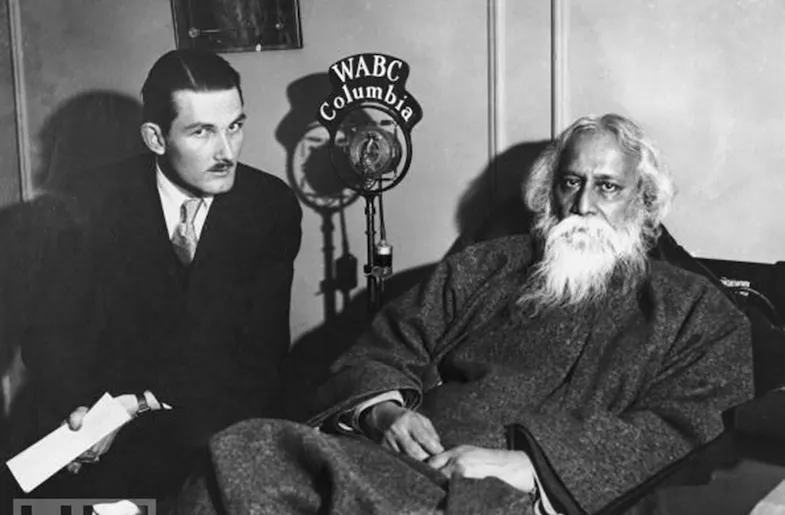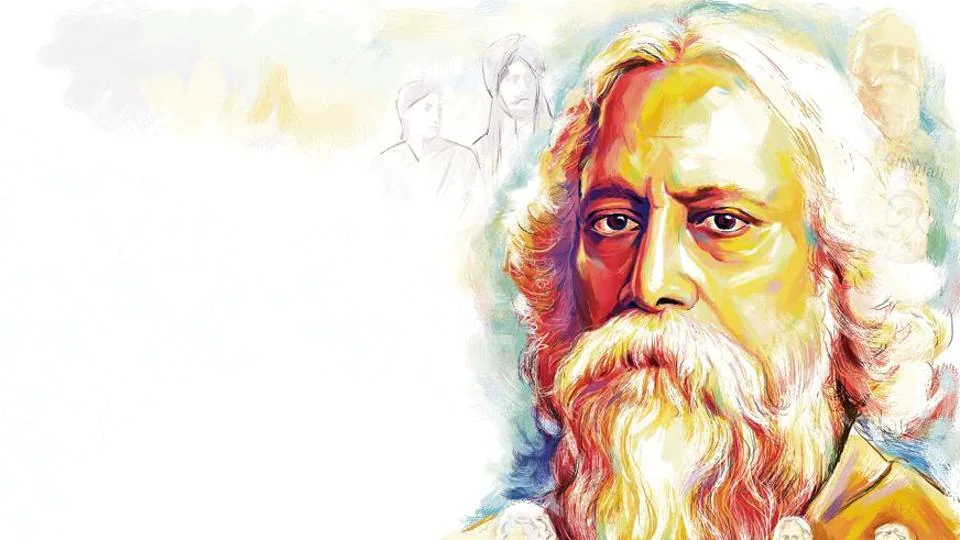
Prasenjit Gupta speaks to Sanjana Karthik about the inspiration behind his modern translation of Tagore’s Gitanjali
Sanjana Karthik
[The birthday of great poet Rabindranath Tagore is being celebrated today the 8th May, at Shanti Niketan as per Bengali Calendar. This day is also the Bengali New Year]
Tagore’s unique poetry

“All great poetry is unique, and Rabindranath’s especially. These songs may be set in Bengal, but their subjects are universal. Only the greatest writers can aspire to, and reach those heights,” says Prasenjit Gupta about his translation of the poems in Tagore’s Gitanjali.
Gupta, who was born in Calcutta, has degrees in Economics and Business Administration from the University of Delhi and the Indian Institute of Management, Calcutta, India. As a writer, he honed his craft at the Iowa Writers’ Workshop, the premier writing program in the United States, where he worked on short fiction and translations from Bengali and Hindi into English. He spoke to India Currents’ Sanjana Karthik about the inspiration for his translation and on introducing Tagore’s poems to a modern audience.
“I wanted to create a new translation of the poems in Tagore’s Gitanjali. I feel that his translations, while very powerful and effective at the time they were published, may have become somewhat dated in the hundred years since. I wanted to offer the contemporary reader a fresh translation that would seem more immediate, using more current English diction.”
Universal themes
Tagore himself inspired the translation says Gupta. “His poetry is universal in its messages, and beautiful to hear in Bengali. It’s impossible to recreate the sound, the inherent music, of these poems—many of which are songs that have been set to music. However, I wanted at least the sense to come across. I get so much pleasure from reading the original poems, and I wanted to bring that pleasure to English readers.”
The songs convey their significance in many ways, adds Gupta, from the very simple to the all-encompassing ways: from the images of everyday village life to the eternal, joyful music of the sun, the moon, and the stars.
The poems and songs in the original Bengali are delightful to the ear, even as spoken poetry, containing charming rhymes, assonance, and other sound effects with many of them have been set to music. “They are rich with metaphor and meaning, image and emotion, all of which speak directly to the heart. Even in today’s world of small and large screens, with their insistent demands on our attention, a few lines of Rabindranath’s short, lyrical verse can serve to quell the madness, to calm the frenzy.”
Enriching verses
Gupta believes the poems convey a connection that needs to be explored, whether physical, spiritual, or merely sentimental. “The main message of these poems —if I can presume to reduce it to one message—is that we all have a personal connection to our surroundings, to the rest of the universe. The connection can be to your beloved, or your lord, or the source of your inspiration, your life energy. The poet opens up ways for us to do that with these poems.”
He suggests two minutes of time is enough to open a page at random and read a poem. “Reading his poems could be the last thing you do before you go to sleep: let your busy day draw to a close with a few thoughts from the Gurudeb, before you turn out the light. Those two minutes will enrich your life forever.”
Working through translations
It took three years to work on the transitions, says Gupta. “Drawing from da Vinci’s words, I can say that translations are never finished, only abandoned. In the morning you might change a word or phrase to another because it rings truer, but in the afternoon you change it back because the original was the right choice. So translations take a long time, often longer than writing the novel or the poems themselves.”
Though there have been several translations of the Gitanjali, apart from Tagore’s own, Gupta feels that existing translations, while very worthy, fell short in some ways. “Tagore’s own renderings, which are still the best, in my opinion. Others have tried to preserve the rhyme, which is ambitious, if not impossible, and they have not fully succeeded. Yet others have produced passable versions but without that special magic that is found in Rabindranath.”
A familiar tradition
Most Bengalis from Kolkata are familiar with Rabindranath’s songs which are sung at cultural functions, in people’s homes, and played on the radio and television. “It was the same for me,” says Gupta. “My parents used to sing his songs. When we went to Kolkata, my large extended family would gather in the evenings to sing Rabindra sangeet and other songs. It’s an indelible part of my childhood.”
Gupta, who now lives with his wife in Alexandria, Virginia, spent most of his working life as a U.S. Foreign Service Officer. As a high school student he was struck by how few Hindi and Bengali stories were available in English translation unlike so much fiction from other major world languages.
Translating Indian works into English
“When I started writing short stories myself, I also began to translate stories from Bengali and Hindi. I find the experience very rewarding—and often challenging, of course. It delights me to imagine that my translations could help find more readers for Bengali and Hindi literature.’
Gupta has been translating mainly short stories and poems from these two languages into English for many years. His first translation from Hindi, Indian Errant, was a collection of short stories by Nirmal Verma.. The second translation from Bengali, Brahma’s Weapon, a series of short stories by Ashapurna Debi was later published in India as Matchbox.

Read: On Tagore’s Trails in America
Gupta also has written a children’s book called Adventures in the Underground Forest, for ten- to twelve-year-olds. Tagore’s Gitanjali is his third book of translation.
In his translations, Gupta tries to stay close to the original text. “The challenge is in ensuring that the translation doesn’t stray so far from smooth, polished English as to become awkward and unreadable. That’s not always easy, especially when translating Rabindranath, who uses highly compressed and poetic language. I can say this was the most difficult translation project I’ve ever undertaken.”
Gupta says his intention for this collection was to recast these songs in an appealing modern idiom so that they might attract a new generation of readers. “I want to believe I’ve succeeded in the former; I hope to succeed in the latter. Ultimately, of course, it’s the reader alone who decides whether the intended purpose of a book is fulfilled.”
Read: Reception of Tagore in Sindhi Literature
The Midwest Book Review said: This book “captures each poem in three ways: in the Bengali original, with Rabindranath Tagore’s translation, and Gupta’s own translation. . . . Tagore’s Gitanjali receives a closer inspection and interpretation than Rabindranath himself achieved; adding an extra dimension of understanding that is strengthened by Gupta’s consideration of what is lost and gained in the translation process. . . . A hundred years after Tagore’s achievement, these poems still hold their allure and power. They are strengthened by the dual translations and, more importantly, by the opportunity to cross-examine the translators’ intentions and choices in side-by-side presentations in two languages.

Tagore’s Gitanjali, published by Parabaas, is available on Amazon in India and the U.S. Parabaas (Parabaas.com), a publishing house based in New Jersey, focuses solely on Bengali literature.
Here is an excerpt from Poem 2:
When you tell me to sing
Pride fills up my heart;
My eyes brim over
As I stare unblinking at your face.
Whatever is hard and harsh in my life
Wants to melt away in honeyed song,
All my penitence and prayer
Wants to fly in birdlike joy.
______________________
Sanjana Karthik has her own writing organization – Your Words Matter To Us, a mental health app – myEsprit, and is the host and co-founder of the Shawmulticultural show – The Reality Is. The Reality Is. Her poetry and articles have been recognized by the Mayor of Whiterock, and various magazines and radio stations, and have been published in anthologies. She is always engaging with her community and advocating for men’s rights, mental health, restorative justice, and other integral topics.
Courtesy: India Currents (Posted on May 8, 2024)
[…] Read: A Fresh Translation Introduces Contemporary Readers to Tagore’s Gitanjali […]
[…] Read: A Fresh Translation Introduces Contemporary Readers to Tagore’s Gitanjali […]